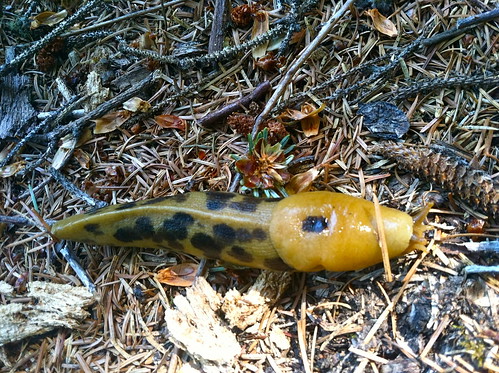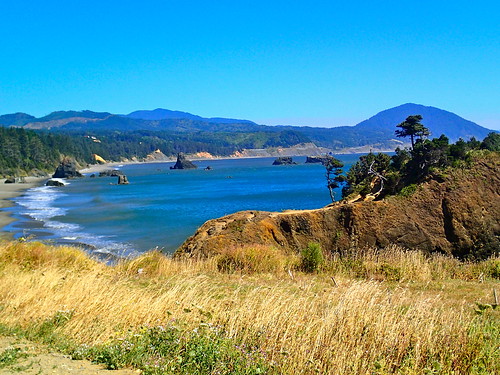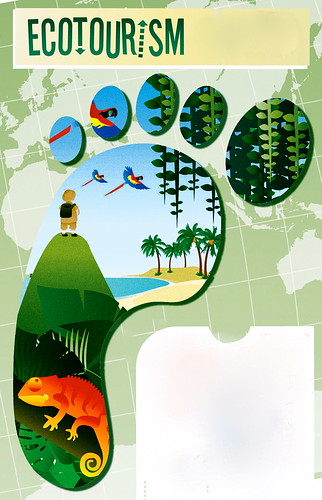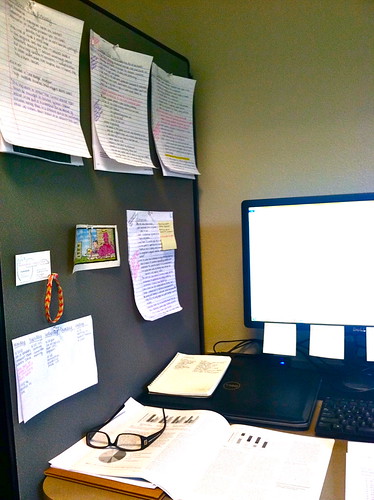Greetings Readers!
I can’t believe it’s week eight already! I feel like the less time I have left here at Wild Rivers Coast Alliance the more things I have to do. Thankfully every now and then I catch a glimpse of one of my alma mater’s glorious mascots and I am encouraged to march onward.
Tomorrow I will be going back to Port Orford to help some members of the Port Orford Ocean Resource Team work on the “Quest” project I had mentioned in my last post. This is very exciting because there are few Quest activities on the South Coast! I hope that after tomorrow I will have a better idea of how I can construct my own Quest activity so I can create a couple for Bandon before I leave. Presently, the Quest begins at the Visitor Center (and the future site of a new interactive Marine Education Center), ends at the Port of Port Orford (unique because it is one of only six “dolly docks” in the world – where gigantic hoists lift the vessels in and out of the water each day), and covers historic and scientific topics such as: low tide, intertidal organisms, the history of Battle Rock, Red Fish Rocks Marine Reserve, and cannery history. Not only are Quests fun, outdoor learning adventures that are great for all ages, but they have the potential to increase and renew a sense of community pride in the town and its assets. Referred to as “community treasure hunts” each Quest requires a closer look at the environment and is centered around a specific topic such as sustainability or invasive species. I think this will be a great way to build each communities’ interest in the natural wonders they have on the South Coast, and maybe even act as a gateway to some new education programs.
Education programs are a challenge in and of themselves. In order to create any kind of sustainable ecotourism, there needs to be interest in and knowledge of the environment since all tourism depends on the environment. The top obstacles to implementing education programs in schools are a lack of money and time to either: a). Fund teachers to receive the training to teach various marine and terrestrial science classes (assuming the teachers have the time to go through the training and find spots where the aforementioned programs would fit into their lesson plans) or b). Find someone who already had the necessary knowledge and is willing to give up their time (and probably any hope of getting paid). It is important to teach future generations that if the environment isn’t properly taken care of, lots of money and time will eventually need to go into fixing it. One problem whose solution I believe lies in marine education programs, is inspiring younger generations to return to fishing; but the problem is that getting them interested in fishing isn’t even the biggest obstacle to overcome. It’s extremely difficult for young fishermen to enter the industry because of limited entry and the high cost of permits, boats, and the necessary equipment. But if you can’t younger generations to join the cause, then how do you create non-fishery related business in communities who have fished for hundreds of years?
Ecotourism to the rescue! Now while this is yet another topic that an infinite list of possible setbacks and issues, as I said in my previous post, I believe (along with my mentors and some of the community members) that it is truly the way to increase tourism. However, before you create new ecosystem services, you need to get more people to stop and stay in each town. In Port Orford one way they’re trying to solve this problem is with a new visually stunning interactive Marine Center that would be located in the hub of the city at Battle Rock Park. The proposed center will have research facilities that can be seen by guests, a near water research facility, a deep ocean research laboratory, live fishery and fish buying , docent tours, touch tanks, and a seafood research facility. Since this would truly be a building unlike any other on the South Coast, it would be a great chance to link future research and programs with ongoing ones in Coos Bay and on the North Coast. Hopefully it will not only attract people who might want to work in the center or research labs, but educate residents and guests as well. It would be wonderful if the new center could facilitate educational programs for local schools; this would introduce science as something that’s interesting and going on right in their backyard!
For the rest of the week I will be getting ready for our Summer Scholars Symposium that’s this Friday at the Hatfield Marine Center. Next week is my last week in Oregon! Besides working on a couple Quest projects for Bandon, I’m not sure what else is in store for me, but I can imagine I’ll find something to keep myself busy.





